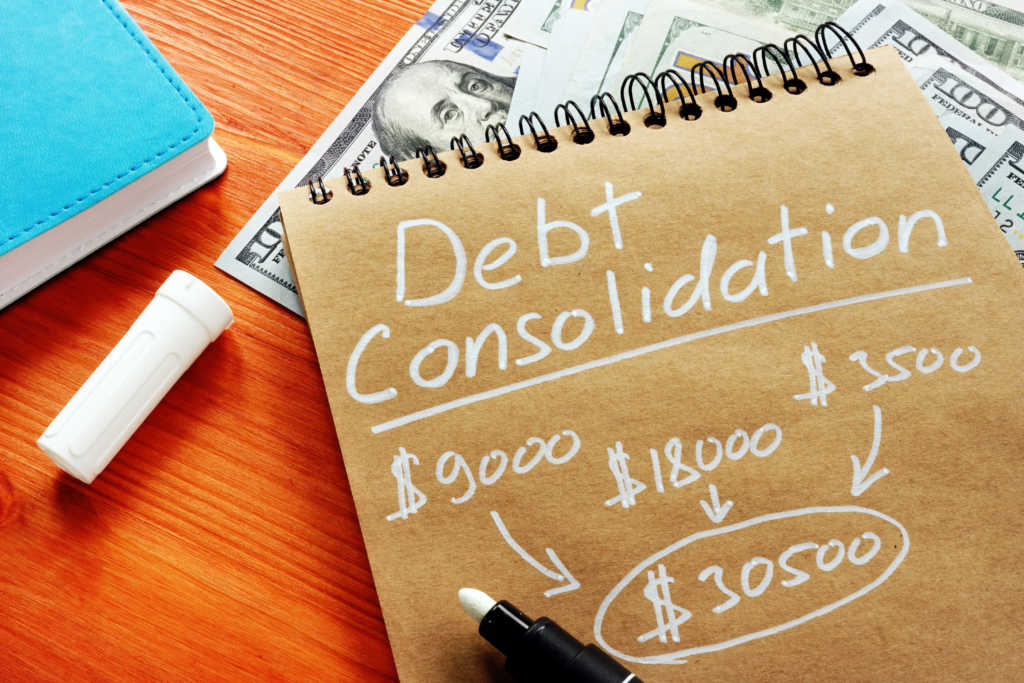
Having debt collectors call you can be a stressful experience. It’s important to remember that the main goal of these companies is to help you settle your debt as quickly and efficiently as possible. They make their money by collecting unpaid debts from borrowers, so they are usually willing to negotiate. In this blog post, we will go over the basics of negotiating with debt collectors and provide tips on how to successfully manage your financial situation.
Contents
How Debt Collectors Make Money
Debt collectors make their money by collecting as much of the outstanding debt as possible from consumers who have defaulted on payments. They purchase these debts at a fraction of their value from lenders and then attempt to recover as much of the original amount owed as possible.
In many cases, debt collection agencies will charge a fee for their services in addition to any payments they collect. However, most states cap the amount that debt collectors can charge so be sure to check your local laws on this matter if applicable. Additionally, some states prohibit debt collection agencies from charging any fees at all.
How To Negotiate with Debt Collectors
The first step in negotiating with debt collectors is understanding your rights. Debt collection agencies must abide by certain laws and regulations when attempting to collect a debt; for example, they cannot harass or threaten you in any way. Knowing and understanding your rights will give you more confidence when entering into negotiations with them.

When dealing with these collectors it is important to remain professional and polite at all times. Even if you are feeling overwhelmed or stressed out about the situation, try to stay calm and courteous throughout the process. This will help ensure that negotiations move along smoothly and efficiently, which will ultimately benefit both parties involved in the transaction. Additionally, it is important to be honest with them about your financial situation so that they can better assess whether or not a payment plan would be feasible for you.
It’s also important to remember that debt collectors are often open to negotiation and willing to work out payment plans that work for both parties involved in the transaction. If a payment plan isn’t feasible for you due to financial constraints or other reasons, then it may be worth discussing options such as settling for less than what is owed or having your credit report updated with positive information after paying off the debt in full. Negotiating can help you reduce or completely erase some of your outstanding debts without having to file for Chapter 7 bankruptcy protection or pay high-interest rates on loans.
Debt Collection FAQs
Here are some commonly asked questions about negotiating with debt collection agencies.
What types of businesses use debt collectors?
Debt collectors are typically used by businesses such as banks, credit card companies, payday loan lenders, and medical providers.
Can I negotiate a lower amount on my debt?
Yes, it is possible to negotiate a lower amount on your debt. Debt collection agencies may be willing to accept less money than what is owed in exchange for not having the full amount due in one lump sum. This can be especially beneficial for people who are struggling to make the full amount due on their debt but want to avoid debt consolidation or bankruptcy.
What happens if I cannot afford my negotiated payment plan?
If you find yourself unable to meet the payment deadlines outlined in your agreed-upon payment plan, then you should contact the debt collector immediately and let them know. They may be willing to work with you on another arrangement that is more.
What are debt collectors legally allowed to do?
Debt collectors are allowed to contact consumers in order to attempt to collect the debt through methods such as phone calls and mail. They may also state their intention to sue the consumer if they do not pay the debt or enter into a payment arrangement.
What are things debt collectors cannot do?
Debt collectors must operate within the confines of the law and cannot use tactics such as harassing, threatening, or intimidating consumers to collect the debt.
Why are debt collectors calling me when I have no debt?
In some cases, debt collectors may mistakenly contact individuals who do not actually owe any debt. If this happens to you, politely explain the situation and ask them to stop contacting you. You may also wish to file a complaint with the Consumer Financial Protection Bureau if you feel harassed or intimidated by the debt collector.
What percentage of debt will collectors settle for?
The amount of debt that collectors will settle for can vary depending on a number of factors such as the amount owed, the financial situation of the debtor, and the individual creditor. Generally speaking, debt collectors may be willing to accept a lower percentage of the amount due in exchange for having it paid in one lump sum. It is important to note that any agreement should be put in writing and not just a verbal agreement.
Can debt collectors text you?
Debt collectors are legally allowed to contact consumers through text messages, although they cannot use automated dialers. Keep in mind that any communication from a debt collector is required to include the name of the creditor they are representing and a statement that any information obtained will be used for debt collection.
Will paying off debt collectors help my credit score?
Paying off debt can help improve a person’s credit score, but it is important to remember that any payment made to a debt collector will not be reported to the credit bureaus. If you want your payment to positively affect your credit score, then a debt collector may be willing to agree to update your credit report with positive information after you pay off the debt in full.
Can I dispute a debt collector’s claim that I owe money?
Yes, you can dispute a debt collector’s claim that you owe money. You should review all of your financial documents carefully and make sure that you are aware of any outstanding debts that you may have. If the debt collector’s records are incorrect or outdated, then you should notify them in writing and ask them to provide proof of the debt. After reviewing all relevant information, you may be able to dispute the debt or negotiate a lower payment plan.
How do fake debt collectors get your information?
Fake debt collectors often use a variety of tactics to obtain personal information from consumers. These tactics include cold-calling, impersonating a legitimate debt collector, and sending emails or text messages that appear to be from a credible source. If you receive any suspicious communication, do not provide any personal information and contact your local authorities immediately.
Who is ERC debt collectors?
ERC Collections, also known as “Enhanced Resources Centers” or “Enhanced Recovery Company”, is a debt collection agency that specializes in collecting on delinquent accounts. They are nationally licensed and bonded and use professional collection techniques to collect debts. They also partner with various creditors to provide debt recovery solutions. ERC strives to ensure that consumers are treated fairly and with respect throughout the process of collecting a debt.
Can debt collectors garnish my wages?
Debt collectors may attempt to garnish your wages if you fail to make payments on a debt. This can be done through the court system and it is important to note that the garnishment process can be complex and involve multiple steps. In most cases, creditors must file a lawsuit against you before they can garnish your wages, which is why it is important to contact an attorney who specializes in debt collections if you are facing a garnishment.
Can debt collectors take your tax refund?
Yes, debt collectors can take your tax refund if you have unpaid debts. It is important to note that while the Internal Revenue Service (IRS) does not take tax refunds to pay for unpaid debts, a creditor or debt collector may be able to intercept your refund if a court has authorized it. You should understand your rights when it comes to debt collection and seek legal advice if necessary.
Can debt collectors take your Social Security benefits?
No, debt collectors cannot take your Social Security benefits to pay for a debt. This is because Social Security benefits are protected from garnishment and creditors cannot seize or freeze these benefits. If you are receiving Social Security benefits and have unpaid debts, it is important to understand your rights and explore other options for dealing with the debt.
Can debt collectors call my employer?
Yes, debt collectors can contact your employer in order to obtain information about you such as your phone number, address or salary. However, they cannot disclose to your employer that they are collecting a debt from you. Furthermore, if you do not wish for them to contact your employer, you can inform them in writing and they must cease communication with your workplace.
Do debt collectors really take you to court?
Yes, in some cases debt collectors may take you to court if you fail to repay a debt. It is important to remember that debt collectors are not allowed to threaten or harass you into making payments. If a court action is taken against you, it is important that you understand your rights and seek legal advice if necessary. Additionally, it is important to remember that debt collectors are not allowed to take you to court if the statute of limitations on the debt has expired. In this case, they are legally obligated to cease collection efforts. However, you may still need to pay off the debt if it is still legally required. Understanding your rights when dealing with debt collectors and exploring all of your options for repayment can help protect you from potential legal action.
How can I get out of debt collectors without paying?
It is possible to get out of debt without paying, however the best option depends on your individual circumstances. If you are unable to pay off the debt in full, you can explore options such as negotiation with the creditor or debt collector, setting up a payment plan, taking advantage of consumer protection laws, or filing for bankruptcy. Additionally, it is important to understand your rights when dealing with debt collectors and seek legal advice if necessary.
How long can debt collectors try to collect in USA?
It is important to remember that even after the statute of limitations expires on a debt, the creditor may still be able to collect in some states. Understanding the law and exploring all of your options can help protect you from potential legal action.
The Fair Debt Collection Practices Act (FDCPA) states that debt collectors cannot contact you for more than 30 days after they have received your written request to stop contact. It is important to note that this does not mean that the debt is erased or forgiven, and you may still owe the debt.
Can debt collectors collect debt from 10 years ago?
Yes, in some states creditors may still collect a debt even after the statute of limitations has expired. It is important to understand the laws of your state regarding the statute of limitations on debt and seek legal advice if necessary.
What is the 11 word phrase to stop debt collectors?
The 11 word phrase to stop debt collectors is “Please cease and desist all calls and contact with me, immediately.” This phrase should be used in writing and sent to the debt collector via certified mail. Doing so will inform the debt collector that they are not allowed to contact you and must cease communication with you. It is important
Does the US Department of Education use debt collectors?
On November 8, 2021, the United States Department of Education declared that private collection agencies will no longer service student loans. This means if a particular agency was managing your defaulted loan(s), they won’t be responsible for them in the future.
Are debt collectors required to be licensed?
Yes, debt collectors are required to be licensed in some states. It is important to understand the laws of your state regarding debt collection and seek legal advice if necessary. Additionally, knowing the laws and exploring all of your options can help protect you from potential legal action. It is also important
Conclusion
Dealing with debt collectors can be intimidating but it doesn’t have to be! By understanding how these companies make their money, knowing your rights under state law, remaining professional during negotiations, and being open-minded about repayment plans—you can successfully manage any outstanding debts without having to resort to drastic measures like bankruptcy protection or high-interest loans. Ultimately it comes down to communication between both parties involved for everyone to come out ahead in this situation!




